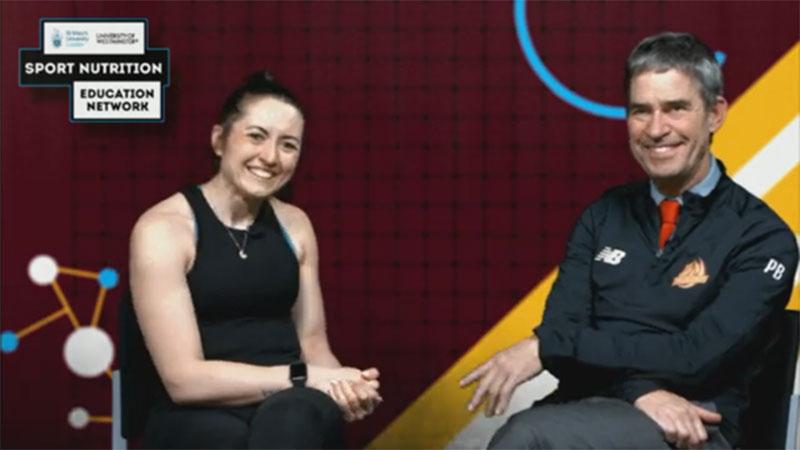Vice-Chancellor and President Professor Peter Bonfield shared his thoughts on sport nutrition and his professional athlete career in a Sport Nutrition Education Network (SNEN) podcast. SNEN is a one-of-a-kind resource created by the University of Westminster’s Dr Sinead Roberts and St Mary’s University’s Dr James Fleming for prospective and current Sport and Exercise Nutrition students, as well as early career practitioners.

Dr Sinead Roberts, who is one of the Course Leaders for the Sport and Exercise Nutrition MSc course at the University of Westminster, and Dr James Fleming, who has the equivalent role at St. Mary’s University, have set up this unique resource to fill a gap in professional development. The aim is to provide unrivalled real-life insights to budding sports nutritionists. Set up in November 2023 the podcast has interviewed sport nutritionists, athletes, strength and conditioning coaches, performance chefs and many more involved in the industry.
Dr Roberts began her career as a cell and molecular biologist, after obtaining an undergraduate degree in Biology from the University of Nottingham. Her PhD from University College London in 2013 focussed on understanding how the cells of the body regulate the addition of mass and volume, in response to growth factor signals, stress signals and nutrient availability. From here she became interested in how cells – and humans – respond to this in the context of exercise, and how this translates to how the body uses food to respond effectively to training, for example, to get fitter, faster and stronger. Ultimately, this led her to the world of sports nutrition, establishing her nutrition consultancy company Feed.Fuel.Perform in 2017. She is now a SENR registered Performance Nutritionist, as well as a Lecturer in Sport Nutrition and Exercise Physiology at the University of Westminster. Her areas of specialism are weight-making and strength-power sports, working with recreational and elite athletes.
In one of the episodes, Vice-Chancellor and President Professor Bonfield shared the story of his journey from a little boy who loved cycling to participating in sport programmes during his university years, ultimately leading to competing as a professional athlete under the British Cycling Federation.
As a professional athlete Professor Bonfield saw sport nutrition starting to play a key role in sport. He said: “It was a really interesting time because there were lots of different aspects of sports science coming together to improve performance.”
After his late twenties, Professor Bonfield started to focus on a career in construction but also doing triathlon management and coaching, including supporting the cycling training of British Olympians. His ambitions came together when he played a major role in the construction and building works for the 2012 London Olympics. On the podcast Professor Bonfield shared his experience of constructing Olympic buildings, and how this project was a major success despite its mammoth scope.
The podcast also discusses how Professor Bonfield enhanced the sport focus at the University of Westminster after becoming Vice-Chancellor in 2018 and what role the University’s clubs and societies – including sports - play in combatting loneliness in the student population. Professor Bonfield said: “We are starting to see how that huge increase in attendance is actually impacting class attendance and how that is impacting educational outcomes.” He shared that by making the gym membership free for all students and colleagues at the University, the number of people actively visiting the gym grew from 150 to 3500.
They also touched upon the Elite Athlete Programme at the University, which provides Westminster’s highest performing student athletes with financial support for competition costs; treatments and sessions with physio therapists, sports psychologists and nutritionists; strength and conditioning coaching; fitness testing; branded kit; and mentoring and development. The nutrition support is provided by Dr Roberts and past and present Sport and Exercise Nutrition MSc students, continuing the theme of the podcast to provide insight and opportunity to the next generation of sports nutritionists.
Talking about the aim of the podcast, Dr Roberts said: “It’s targeted mainly at Sport Nutrition students, prospective students and early career sports nutritionists. We are providing a forum for things you cannot get inside the classroom. It’s insights into what people’s experiences are in sport. So, for example, if they are working in sports at elite events, there is the sustainability aspect – it’s something that is really important to consider. So when it comes to nutrition, what does it mean in terms of waste and food delivery? Or the idea of how people’s journeys come about in sport, or stories of how people succeeded. This is all about giving people ideas in terms of what career they want, and any advice people have for people starting out in their career.”
About the impact of sports nutrition, Professor Bonfield concluded: “The topic area of Nutrition in sport or how you apply it is very important. It makes a huge impact on the performance of athletes or, more broadly, on the wellbeing of society. There is a lot learnt already and there is a huge amount more to learn, apply and inform people about. The very motivating thing is when you see people’s improvement. It’s a hidden secret performance enhancement that people often miss.”
Watch the Sport Nutrition Education Network podcast titled Prof. Peter Bonfield: Athlete, Coach & Sport as a Conduit for Wellbeing.


